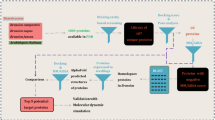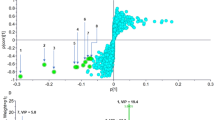Abstract
ANTIBIOTICS are being used increasingly for the chemotherapy of plant diseases. In tobacco it has been proved effective to use streptomycin to control blue mould1 and wildfire2. In Datura stramonium, Steinegger3 showed that penicillin increased both the growth and alkaloid production. Nickell4 stated that a change in the alkaloid content of tobacco plants by using antibiotics could be utilized to good advantage.
This is a preview of subscription content, access via your institution
Access options
Subscribe to this journal
Receive 51 print issues and online access
$199.00 per year
only $3.90 per issue
Buy this article
- Purchase on SpringerLink
- Instant access to full article PDF
Prices may be subject to local taxes which are calculated during checkout
Similar content being viewed by others
References
Grosso, John, J., Plant Disease Reporter, 38 (5), 333 (1954).
Heggestad, H. E., and Clayton, E. E., Plant Disease Reporter, 38 (9), 661 (1954).
Steinegger, E., and Gessler, F., Pharm. Acta Helv., 28, 256 (1954).
Nickell, L. B., Science News Letter, 67, 14 (April 2, 1955).
McMurtrey, jun., J. E., U.S. Dept. Agric. Tech. Bull., 340 (1933).
Author information
Authors and Affiliations
Rights and permissions
About this article
Cite this article
TSO, T., JEFFREY, R. Effect of Antibiotics on the Growth and Alkaloid Production of Tobacco Plants. Nature 178, 800–801 (1956). https://doi.org/10.1038/178800a0
Issue date:
DOI: https://doi.org/10.1038/178800a0
This article is cited by
-
Antibiotic use on crops in low and middle-income countries based on recommendations made by agricultural advisors
CABI Agriculture and Bioscience (2020)
-
Einfluß von Penicillin in hoher Konzentration auf Wachstum und Sauerstoff-Aufnahme von Erbsenwurzeln bei Kultur in vitro
Die Kulturpflanze (1967)
-
Gleichzeitige Induktion von Sprossen und Wurzeiln an in vitro Kultivierten Gewebestücken vonCyclamen persicum
Planta (1959)



